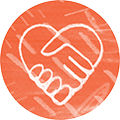
Formal influencing roles: exploring your options
Here we have information to support you to explore different influencing roles and activities. This will allow you to explore which role best suits the time you have, the level of reach you would like to have, and to define your role as a Citizen/Lived Experience Liaison.
 Spotlight on learning from local partner Moray Wellbeing Hub
Spotlight on learning from local partner Moray Wellbeing Hub
The content displayed on this page was produced by Moray Wellbeing Hub and describes their reflections, experiences and learning over the years about lived experience leadership in driving change in healthcare / mental health services.
Visit Moray Wellbeing Hub- Formal Liaison / Representative role:
- Campaigner / activist:
- Discussion / action Group contribution:
- Survey contribution:
- Communications:
Formal Liaison / Representative role:
Example activity
- Representative at NHS board
- National representative for your locality in government group
Social contact level / reach
High
Anonymity
Low
Time
High
Ongoing commitment for attendance and preparation.
Campaigner / activist:
Example activity
- Hosting conversations at a ‘Time to Talk’ event
- Write opinion piece as a blog
- Interviewed for press article
Social contact level / reach
High
Anonymity
Low
Time
High for a short period of time until chosen activity ends.
Discussion / action Group contribution:
Example activity
- PEG – Patient Empowerment Group membership
- Peer-support group in creating feedback to a local service
Social contact level / reach
Medium
Anonymity
Medium
Time
Attendance time but minimal preparation required.
Survey contribution:
Example activity
- Commenting on new mental health policy
- Agreeing to be interviewed as a case study for a service
Social contact level / reach
Medium
Anonymity
High
Time
Flexible and no preparation
Communications:
Example activity
- Bringing topics into conversations with friends and family, your own GP or nurse etc
- Sharing social media posts in your networks
- Putting up posters in your local area
Social contact level / reach
Low
Anonymity
High
Time
Minimal/flexible
Key things to consider when agreeing to an opportunity with an organisation
- Expenses: If you are volunteering to deliver activity, it is important to recognise you are offering your time and experience, but you should not be out of pocket. Always ask if you can get expenses and read their guidance carefully
- Training: Having more skills and awareness makes us more effective. If training is not provided, then ask if some can be provided, or if you can shadow someone who as delivered before
- Boundaries: Having a clear role description can be a great help to understand what expectations are on you. A simple written agreement helps keep clear boundaries
Creating the involvement opportunity yourself? Support can be available through local community support organisations as well as national bodies. You may need to meet certain criteria.
Defining a role as a Citizen/Lived Experience Liaison
You may find this title more empowering than ‘Representative’ as use of this can both challenge preconceptions of the role (people will ask ’what does that title mean?’) and in the level of activity you are expected to achieve. It also challenges the notion that mental health experiences are ‘typical’ of any one group, which can help to prevent tokenism.
- Representative: a person chosen or appointed to act or speak officially for another or others.
- Liaison: link, connection, intermediatory between different groups facilitating communication.
Example of a role description of a Citizen/Lived Experience Liaison
Attends working groups, committees, and partnerships as a visible peer with direct experience of services/supports these groups relate to. Is effective only if liaisons are explicitly committed to sharing a range of experience, not just their own. Most effective when
- There are two individuals delivering the same role. This provides peer-support to each, a range of views, as well as cover when one cannot attend
- Individuals are supported by an external body with specific remit, resources, and skills to support peers. Providing direct support to the individuals in this role as well as a route to disseminate learning from these groups and for feedback and experiences to bring to the groups’ attention.
Role responsibilities include
- providing their own and other’s living/lived experience perspective to the discussions and deliberations of those groups
- raising those groups’ awareness of activity and resources led by peers
- encouraging others with living/lived experience also attending to feel welcomed to bring this perspective through challenging stigma and power imbalance within the meeting space in a strength-based manner
- facilitating two-way communication between these groups and relevant peers/ peer-led groups. This includes between meetings
